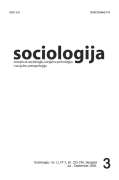Semiotički kôd izraza ’drug’ i ’gospodin’
The Semiotic Code of ’Comrade’ and ’Mister’
Author(s): Ratko BožovićSubject(s): Language and Literature Studies
Published by: Sociološko naučno društvo Srbije
Keywords: code; semiotic; comrade; female comrade; mister; madam; messieurs; ideology
Summary/Abstract: The paper analyzes the meaning of expressions (terms) „comrade“ and „mister“, especially with respect to established socio-political orders. What is at issue are the differences between communicative communities based on different mutual understandings among citizens by using expressions „comrade“ and „mister“, i.e. female „comrade“ and „madam“ (“miss”), within the framework of certain semiotic code or codes. Special emphasis is put on the ambivalences of communist ideology regarding the mandatory introduction of “comrade” as the only permitted form of address („we are all comrades“), while the term „mister“ was eliminated from communication as a class-based title. At the same time, the main “comrades” of the communist government were arguably masters of not just the quantity but also the quality of other people’s lives. It is especially interesting to cast a retrospective glance at the widespread everyday practices of addressing each other first as comrades during communism, and then as messieurs and madams (misses) in postcommunism, often without having established any real value criterion, and without finding a way of adequately acknowledging a citizen as a “mister”, that is, a “gentleman”.
Journal: Sociologija
- Issue Year: 51/2009
- Issue No: 3
- Page Range: 279-290
- Page Count: 12
- Language: Serbian

